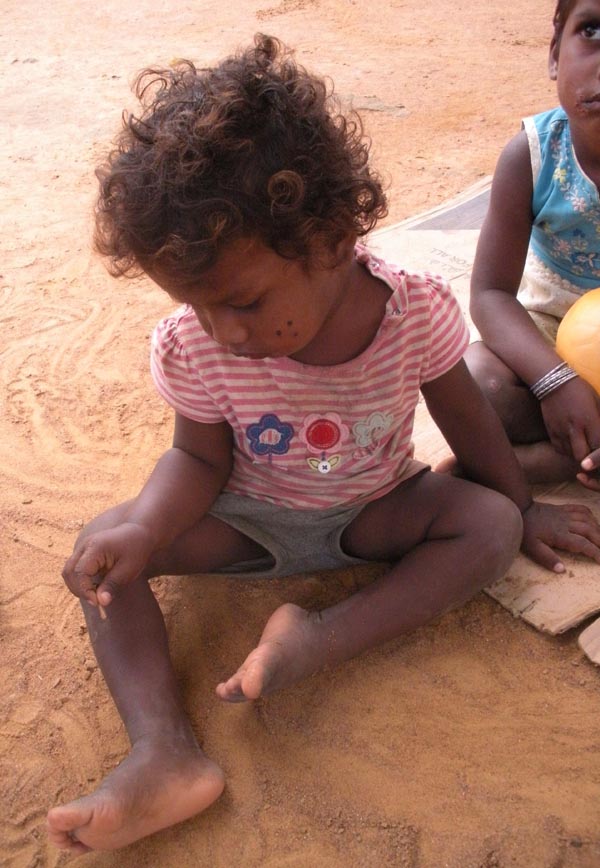By Lindsey Peugh, Research Associate – ICTPH
 In an effort to better understand the context and determinants of child development in rural Tamil Nadu, ICTPH staff members visited three Integrated Child Development Services (ICDS) centres over the last week. Delivered through village-based Anganwadi Centres (AWCs), ICDS provides an integrated package of services for children aged 0-6 including immunisation, health checks, supplementary nutrition, treatment for minor conditions, referrals to health clinics, and early education for children. One of the largest child development programs of its kind in the world, ICDS supports millions of women and children across India, reaching out to even the most remote villages and vulnerable individuals. However, our site visits showed that despite the vast coverage and good intentions of ICDS, the implementation, utilisation, and monitoring of services is low; teachers for the AWCs are lacking; and children’s health and hygiene is often overlooked.
In an effort to better understand the context and determinants of child development in rural Tamil Nadu, ICTPH staff members visited three Integrated Child Development Services (ICDS) centres over the last week. Delivered through village-based Anganwadi Centres (AWCs), ICDS provides an integrated package of services for children aged 0-6 including immunisation, health checks, supplementary nutrition, treatment for minor conditions, referrals to health clinics, and early education for children. One of the largest child development programs of its kind in the world, ICDS supports millions of women and children across India, reaching out to even the most remote villages and vulnerable individuals. However, our site visits showed that despite the vast coverage and good intentions of ICDS, the implementation, utilisation, and monitoring of services is low; teachers for the AWCs are lacking; and children’s health and hygiene is often overlooked.
In a conversation with the cook at the first AWC we visited, ICTPH staff members learned that the teaching post for the centre had been vacant for nearly two years. This has meant that the centre is often closed except during the time the cook prepares lunches. Further, supplies provided by the state government such as iron drops and oral rehydration salts are not administered when needed because there is no trained person to do so. Due to the lack of adequate supervision at the centre, the six children present were playing with small toys inappropriate for their ages, posing a risk of choking. The question remains whether age-appropriate toys have even been provided or if these are also lacking.
The second site we visited displayed a situation much worse than the first as there was no AWC building available to house the ICDS activities, and again, no teacher. Sadly, we saw three small children, all around the age of two, sitting on a piece of cardboard in the dirt. The children were covered in mud with severe signs of anemia and other nutritional deficiencies. Due to the fact that there was no teacher, the children were given no attention and stimulation while the cook was preparing their lunchtime meal. We were told that funds have been promised to construct an AWC, but months have passed and still there is no building in sight.
Finally, the third centre we visited showed some promise. Again the teacher’s post was vacant, but the cook we spoke with has been working with ICDS for 27 years. She has been able to take on the role of teacher, keeping the centre open all day, preparing and providing the food, as well as looking after the hygiene, health, and psychosocial stimulation of the children. Because of her long history with ICDS, she was able to provide an in-depth knowledge of service utilisation and implementation. Under the ICDS scheme, for instance, eggs are provided for children on three fixed days of the week which has resulted in some parents only bringing their children to the centre on these days during the lunchtime hour. As a result, these children miss out on the nutritional and educational benefits provided at the centre.
Much progress has been made to address maternal and child survival in India but much more needs to be done with regards to this and child development and these site visits helped us to understand where potential gaps in services can be filled. ICTPH hopes to address these issues to improve child health and development in rural Tamil Nadu so that children are able to reach their developmental potential leading to a course of good health, increased school readiness and performance, increased economic potential later in life, and an end to a cycle of poverty. As we move forward with this project, we welcome any comments and suggestions from others in the field so that we can develop a well-informed, feasible model.


Leave a Reply
3 Comments on "Understanding child development and nutrition in rural Tamil Nadu: Site visits to Anganwadi Centres"
Bhuvana, I’d love to hear your stories of working with ICDS. Would be interesting to hear your perspective having worked first hand with the program.
Good job, Lindsey. Great but sober article. Looking forward to hearing great progress in the way you will help these people. Keep up the good work.